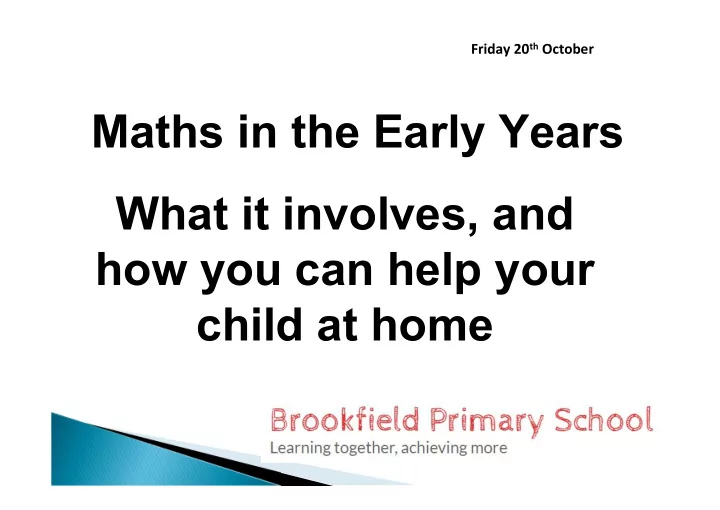

Friday 20 th October Maths in the Early Years What it involves, and how you can help your child at home
Why do the majority of children who come to school for the first time know the numbers 1 to 3, but only some know 4? Ready? 1…2… 3 !
Recipe for Success in Early Years Maths • A large scale study of pre-school experiences (Sammons et al 2002, Siraj-Blatchford et al 2002) found two key factors which predict progress: • parents providing a hom e learning environm ent , where, for instance, children were encouraged to paint, draw and play with letters and numbers • Early Years settings providing adult-led m athem atics focused activities , such as number rhymes and games, alongside independent play
What do children learn in Mathematics in Nursery and Reception? • Numbers: children count reliably with numbers from 1 to 20, place them in order and say which number is one more or one less than a given number. Using quantities and objects, they add and subtract two single-digit numbers and count on or back to find the answer. They solve problems, including doubling, halving and sharing. • Shape, space and measures: children use everyday language to talk about size, weight, capacity, position, distance, time and money to compare quantities and objects and to solve problems. They recognise, create and describe patterns. They explore characteristics of everyday objects and shapes and use mathematical language to describe them.
How do we teach Maths in Early Years • Whole class lessons, (Everyday in reception) including chanting and using images to show different numbers • Play / Art / Outdoor activities involving numbers • Interactive Whiteboard Games • Investigations • Stories and songs involving numbers
What they should know and when? https://www.foundationyears.org.uk/files/2015/09/4Children_ParentsGuide_Sept_201 5v4WEB1.pdf
How can you help your child with Maths at home? COUNTING: • Don’t stop at 3…or 10! Count forwards and backwards. • Nursery Rhymes and stories. • Providing opportunities to count indoors and outdoors. • ‘More or Less’ ‘The Same’
How can you help your child with Maths at home? Understanding number • “ How many” Subitising (number sense), especially • understanding number symbols, e.g. ‘the fiveness’ of 5. Recognise numbers as dice and dominoes patterns • compare numbers like 5 and 7, saying which is more • predicting the result of adding or taking away one. •
How can you help your child with Maths at home? Understanding number
How can you help your child with Maths at home? Doubling, halving and sharing • Games where food / objects have to be shared fairly. • Games involving doubling • Using language of ‘the same’ or equal’. • Is that fair?
How can you help your child with Maths at home? Shape, Space and measure • Sorting toys / objects by size, weight, tallest to shortest. • Introducing language of shape, e.g. outdoors – “What shape”? “What shape would you like toast?” • Talking about money (and using money in shops!)
Use games as an opportunity to develop number sense and counting! Outdoor games (e.g. skittles) – Great for exploring counting!
What questions do we have?
Recommend
More recommend